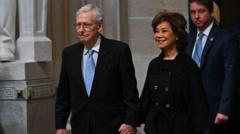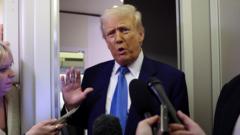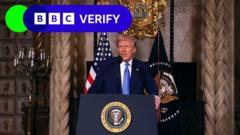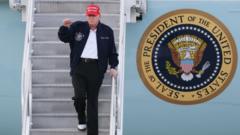European leaders are in a state of recalibration as they face the reality of an increasingly adversarial relationship with the Trump administration, particularly in response to recent developments regarding Ukraine.
Europe Recalculates Amid Hostility from Trump Administration

Europe Recalculates Amid Hostility from Trump Administration
As tensions rise, European leaders are contemplating their future strategies without the assurance of U.S. support.
In a hastily convened meeting in Paris, European leaders reflected on the implications of President Trump's unilateral moves towards a peace settlement in Ukraine, which exclude Ukrainian and European input. This decision has prompted a serious reassessment of Europe’s reliance on the U.S., a key ally that is now acting more like an adversary.
While the Trump administration's approach has unsettled European leaders in Berlin, Paris, and London, it has also led to urgent discussions about Europe's military commitments. The heightened tensions and security concerns are driving conversations around the potential deployment of European troops as peacekeepers in Ukraine. Countries such as Britain, France, and Germany are considering significant increases in their military budgets, an adjustment that recalls the Cold War era.
Lawrence Freedman, an expert in war studies, has commented on the anxiety among European leaders, noting the necessity for Europe to bolster its military readiness. However, the prospect of deploying troops in Ukraine is fraught with political complexities; public support for Ukraine remains strong, yet the domestic implications of an active military presence could pose significant challenges for leaders like France’s President Emmanuel Macron, whose administration already faces vulnerabilities.
As Europe grapples with these strategic considerations, the path forward is laden with complications, balancing international responsibilities against domestic political realities. The situation underscores an evolving geopolitical landscape where Europe may have to act independently, with uncertain consequences.
While the Trump administration's approach has unsettled European leaders in Berlin, Paris, and London, it has also led to urgent discussions about Europe's military commitments. The heightened tensions and security concerns are driving conversations around the potential deployment of European troops as peacekeepers in Ukraine. Countries such as Britain, France, and Germany are considering significant increases in their military budgets, an adjustment that recalls the Cold War era.
Lawrence Freedman, an expert in war studies, has commented on the anxiety among European leaders, noting the necessity for Europe to bolster its military readiness. However, the prospect of deploying troops in Ukraine is fraught with political complexities; public support for Ukraine remains strong, yet the domestic implications of an active military presence could pose significant challenges for leaders like France’s President Emmanuel Macron, whose administration already faces vulnerabilities.
As Europe grapples with these strategic considerations, the path forward is laden with complications, balancing international responsibilities against domestic political realities. The situation underscores an evolving geopolitical landscape where Europe may have to act independently, with uncertain consequences.























